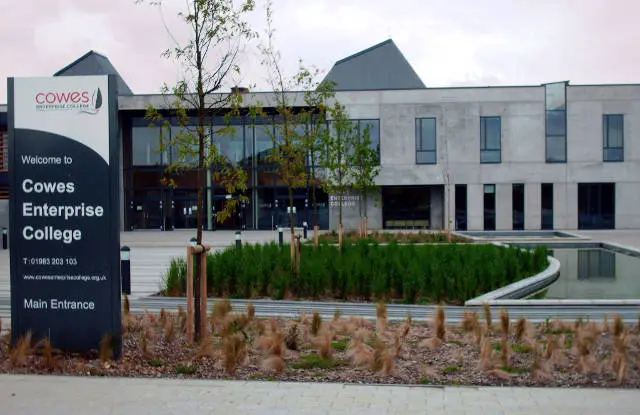As indicated last month, members of the Cabinet will be considering a report next week and a proposal for Hampshire County Council Property Services to take control of the completion of Cowes Enterprise College.
The paper released yesterday reveals there are still many snagging issues to complete at the new building, as well as demolition and clearance of the old school buildings.
A catalogue of problems
The design, build and occupation of the £36m school has been plagued with problems from the very beginning. The initial procurement process had to be aborted, on legal advice that the process followed was not compliant with regulations.
According to the paperwork, the council don’t seem to have a clear idea of who project managed the procurement process.
The report states, “The initial stage of the procurement process appears (our emphasis) to have been project managed by the then interim head of strategic procurement, who subsequently left the Council at the end of August 2009.”
Design: High standard of sustainability requirement
The initial design brief insisted the building “must achieve a high standard of sustainability including significant carbon reduction with an overall aim to become carbon neutral”.
As readers will remember, one of the current issues facing the school is the ongoing running and maintenance costs of the 150 air conditioning units that were added to the design at a late stage, when the contractor said the initial design was unable to be carried out.
The council has agreed to “monitor the energy usage and costs over the period of twelve months to take into account seasonal fluctuations and that if there is a problem as a result of this, will work with the College to identify solutions.”
Room for deadline to slip by a year
Outside consultants, White Young Green, were appointed in November 2009 to manage the project.
Paperwork reveals they raised concerns with the Council about the timings of the project, citing “concerns that a ‘full, inventive competitive dialogue process’ could be run and still have works started soon enough to open a school by September 2012”.
It’s surprising to read that “The principal officer school’s capital programme indicated that it might be possible to have the deadline slip by a year.”
As readers will know, the deadline did slip by a year. Pupils only started occupying the new school in September 2013 after a series of ‘delays’.
How Pihl were selected
During the bidding process it was agreed that only four companies would be considered in the final round.
Of the seven bidders who were invited to participate in dialogue Vinci withdrew, Pihl and Neilcott were deselected and Kier, Bouygues (Warings), BAM Construction and McAlpine proceeded to the next stage.
It seems that Pihl only managed to make it onto the final shortlist because Bouygues (Warings) pulled out, “on the basis of timing and resources”.
Final bids stage were received in May 2010 and evaluated by council officers and specialist technical advisors. Pihl UK were appointed as the preferred bidder and paperwork states, “the timetable indicated a completion date for the project of July 2012”.
Bankruptcy and administration
As we know, Pihl UK’s Danish parent company filed for bankruptcy in August 2013.
The UK company formally went into administration on the following month, leaving the council with yet another issue related to the building.
ICT contract not signed off
Despite the building being “finally signed off as being complete in May 2013”, and occupied from September 2013 the ICT contract has yet to be signed off as being complete.
The paper states that certain items remain outstanding.
Snagging issues
As mentioned, the building was “finally signed off as being complete in May 2013”, however a number of snagging issues are still outstanding.
These are listed as leaks in the roof, doors that need to be replaced or redesigned and concerns over ventilation and temperature control in certain areas of the building.
The council say that “a project team will be required, consisting of technical and project management specialists, to scope design and implement the necessary works”.
Second phase of project
Putting the snagging issues aside, as Pihl UK have now gone into administration, the council will also need to appoint another contractor to complete phase two of the project.
Namely this relates to the “external works including the provision of a multi-use games area and the demolition of the old college buildings”.
According to the paperwork, this budget is still available but “the works involved need to be scoped and tendered and a contract let and managed”.
Hampshire to take over completion
Hampshire county council already undertake the asset management of schools on the Island, but this project is currently excluded from that.
It’s being proposed that because “they have the experience, expertise and capacity to bring the Cowes Enterprise College to completion” that the Isle of Wight council (IWC) enter into an agreement with them to do this with the Managing Director, Dave Burbage, retaining client control on behalf of the IWC.
A commitment of £30k has already been made with Hampshire county council to start scoping the work.
The council needs to ensure the completion of this project. This will in turn enable the transfer of this school to the new proposed Academy.
The proposal
The Cabinet are being asked to agree that:
a) A legal agreement be entered into with Hampshire County Council Property Services to
undertake the management of the Cowes Enterprise College to completion.b) the Managing Director be delegated the authority to act as the overall client for the project and in conjunction with the Cabinet Member for Children’s Services agree necessary works and urgent actions to complete the project subject to any significant proposed spend outside of funding provisions available being reported to Cabinet for approval.
c) progress of the project be reported as part of the Council’s overall performance management of the capital programme that is included in the quarterly reports to Cabinet
Members of the public are welcome at Cabinet meetings and can ask questions at the beginning of the meeting. The meeting takes place on Tuesday 10th December from 6.30pm.





